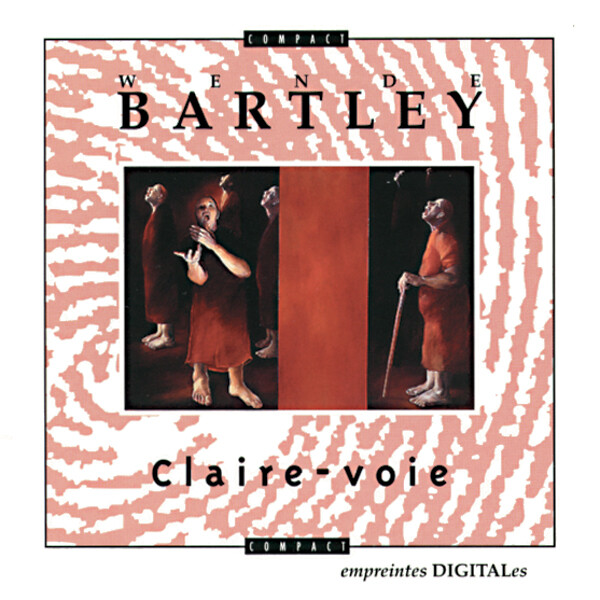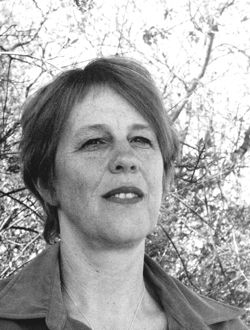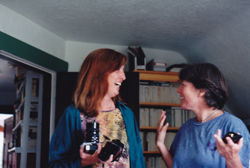[CD]
Wende Bartley — Claire-Voie (1994)
Wende Bartley — Claire-Voie (1994)
empreintes DIGITALes [IMED 9414], 1994
Composer Wende Bartley works in a variety of media, including computer music, film, dance and concert music, experimental radio documentaries. She received her MMus in composition from McGill University (Montréal, 1989) studying with alcides lanza and John Rea. Other compositional studies were completed at York University in Toronto with James Tenney and at the University of Toronto. She has received several commissions with the assistance of the Canada Council for the Arts and the Ontario Arts Council. Her works have been performed at Sound Symposium (St John’s), CEC Electroacoustic Days, Music Gallery (Toronto), Vancouver New Music, International Computer Music Conference (Montréal), New Music Across America Festival (Vancouver), and Groundswell (Winnipeg). Her mixed and instrumental pieces have been performed by the Evergreen Club Gamelan, Hemispheres and Continuum Contemporary Music. Bartley is an Associate Composer of the Canadian Music Centre (CMC) and a member of the Canadian Electroacoustic Community (CEC). [empreintes DIGITALes, 1994]

Claire-Voie brings together four electroacoustic pieces by Wende Bartley that were composed between 1985 and 1993. The work is characterized by Bartley’s dense texturing of instrumental, vocal and recorded environmental sounds, as well as her exploration of the performing potential of the female voice. It is powerful and evocative work.
Ellipsis (1989–93 / 14:31) is a work for female singer and tape. Sung by mezzo-soprano Fides Krucker, this piece explores extended vocal techniques such as multiphonics, glottal stops and vocal fry, in a tripartite structure associated with the lunar phases and chronicling a threefold story of women’s collective unconscious, which Bartley terms “The Age of Darkness, Creating a New Space, and The Age of Resonance.” 1[1. See also Hannah Bosma’s description of the piece in “Male and Female Voices in Computer Music,” ICMC 1995, Proceedings of the 21st International Computer Music Conference, pp. 141–142.]
The second piece, Rising Tides of Generations Lost (1985, 1993 / 15:01), is my current favourite on the CD. It starts with whispered vowels, consonants and syllables, moving through to spoken words and finally longer phrases that are almost buried, yet rise again through the fires that tortured and silenced women. In her description of the piece, Bartley quotes American novelist Kate Chopin regarding the beginning of things as being “vague, tangled, chaotic, and exceedingly disturbing. How few of us ever emerge from such beginning! How many souls perish in its tumult!” Disturbing as it is, I always feel hopeful and energized as strong voices emerge clearly at the end.
Ocean of Ages Revealed (1991 / 13:21) explores the gestures of Balkan vocal music, as well as other sources, through the PODX granular synthesis system developed by Barry Truax at Simon Fraser University. This process allows composers to expand and stretch the sounds to reveal microscopic shifts and changes in a slow-moving tapestry. The piece is based on a visual image by Susan Griffin, in which we travel into the darkness of a cave, seeing images of another time etched into the walls.

The last piece, Icebreak (1992 / 14:22), evokes the world of ice melting, dissolving and transforming into water, moving through “states of rupture, isolation, introspection, passion, and infusion.” It is made of textures created from short improvisations on instruments from the Kyai Madu Sari, the Javanese court-style gamelan. The textures form rhythmic and melodic streams that echo through sound space.
I find in Bartley’s music a source of spiritual energy and feminist consciousness that is matched by musical and technical diversity and depth. I listen to this CD often.
January 1998
Biography

Soundscape artist Andra McCartney (1955–2019) created multimedia works, audio postcards, radio art and works for dance. Born in Fleetwood, near Liverpool (United Kingdom), she lived in several other British ports before moving to Canada with her immediate family in 1968: her daughter was born in 1979, her son in 1980. She received a BA in Cultural Studies from Trent University (1983) and an MA in Adult Education from St. Francis Xavier University (1990) before completing her PhD in Music with a dissertation on the work of Hildegard Westerkamp at York University (1999). While living in Toronto, Andra co-hosted Auditory Transitory (CIUT Toronto 89.5), a weekly radio show devoted to soundscape composition and radio art. She lived in several parts of Ontario and northern Canada, moving to Montréal in 1999, where she taught Sound in Media for the Communication Studies department at Concordia University. McCartney has acted as a board member of the Canadian Electroacoustic Community (CEC) and the Canadian Association for Sound Ecology (CASE). [2022]
http://electrocd.com/en/artiste/mccartney_an
Social top